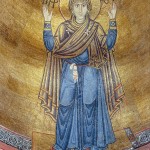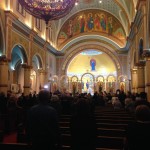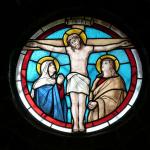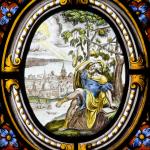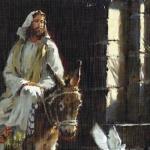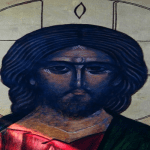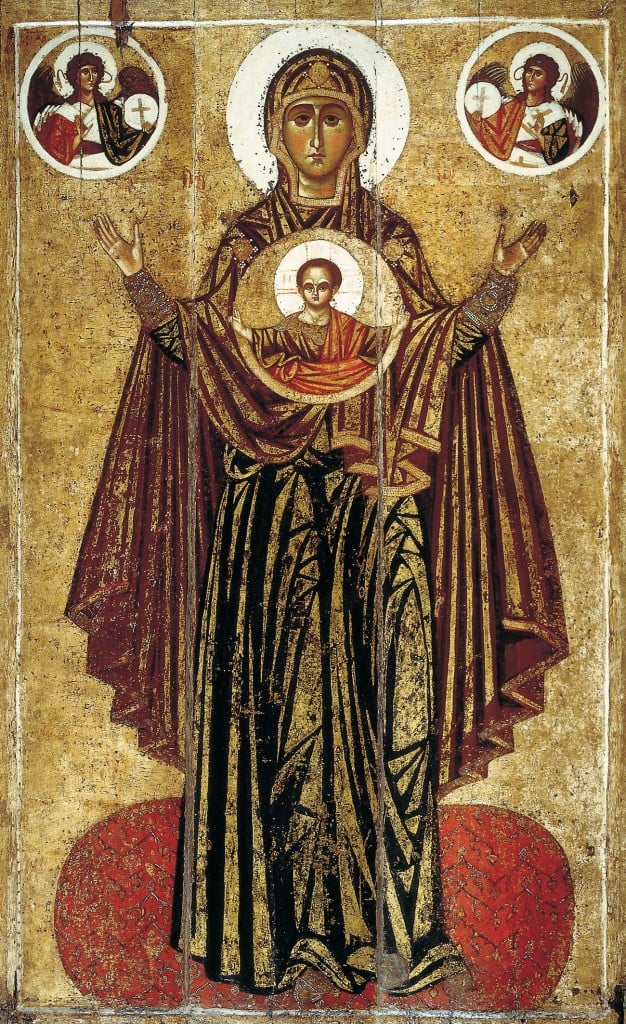
This is the first post on my blog to mention the forum ‘Catholicity: Identity and Its Discontents’ on Patheos Catholic. I have many thoughts on the subject, some more jumbled than others. Therefore, this certainly will not be my last word on catholicity and the awkwardness of thinking about it in terms of the politics of identity.
My last post was a jumbled reflection that started with Christ’s salvation and then jumped to the Protection of the Theotokos even though that feast isn’t for another two months and then went to St Nicholas through the repose of Bishop Richard (Seminack) and finally ended up with St Mary of Egypt.
But it appears that my free associations didn’t stop my spiritual father from reading it. While I was grocery shopping after finishing it up (apparently, this is a common practice among Patheos writers after blogging), he messaged me with a recording of the ancient hymn to the Theotokos, ‘Beneath Your Compassion’ – one that he had in fact sent to our Richmond mission in preparation for the Great Fast. Unfortunately, it’s not online, or else I’d link to it.
I mention this not only to reassure one of my astute readers who warned me against blogging without consulting my spiritual father (he does read the blog, but alas, he cannot be blamed for any of my foolishness), but also to call attention to how ancient the very notion that the Theotokos protects us actually is. The text of the hymn, as I learned it, is:
Beneath your compassion,
We take refuge, O Mother of God:
Do not despise our petitions in time of trouble:
But rescue us from dangers,
Only pure, only blessed one.
Apparently, it’s old, very old, apparently the oldest extant hymn to the Theotokos of which we know. It also seems to be used by everyone – Copts, Armenians, Byzantines, even the Latins who call it ‘Sub tuum praesidium.’
As another of my astute readers angrily pointed out, it feels terribly ignorant for me to call myself an ‘Eastern Catholic Person’ when Copts, Armenians, Byzantines, Syriacs, Ethiopians, and Chaldeans worship so differently from each other. Each one has its own identity, and it even matters to each one’s identity whether I call them a ‘rite’ or a ‘church,’ which is politically tricky business, even though I prefer to use the word ‘church’ most of the time as a matter of dignity while recognizing that ‘rite’ is a nice vague term that can cover up some of the political nastiness sometimes (although ‘rite’ also evokes political nastiness in its own right).
But the protection of the Theotokos is not bound to an identity, at least not as conceived in this modern era as living according to one’s self-definition of one’s self. If ‘Beneath Your Compassion’ is such an old hymn that is used by everyone – even the Latins! – then it is not our identity that makes us Catholic, and by this big ‘C’ Catholic, I do not only mean the Latin Church, and I am certainly referring to my not-so-secret hope against hope for the Christian ecumene to be restored from its many schisms. Catholicity is not about who I say that I am; it’s about the persons to whom I relate.
Of course, I didn’t always think about relating to the Theotokos outside of the rubrics of the politics of identity. I went to a Pentecostal school in Fremont, California, where I had a lot of Latin Catholic friends because the school took in everyone who paid the tuition (and probably many who couldn’t as well, come to think of it). I remember hearing from them that they also prayed to Mary, which struck me as a second-generation Chinese evangelical not as something bad or good or even weird, but just something I’d never heard of before. Of course, when I told my mom this, she said, ‘Oh, yes, Catholics do pray to Mary, it’s true.’ I asked whether we could too. No, she said, we’re not Catholic.
As with most people growing up in the Protestant churches, I eventually got it into my head that Protestants pray to Jesus and Catholics pray to Mary. Imagine my surprise, then, when one time as I was praying with a Filipina nun (which was, of course, just another day in the life of being Anglican for me), she suddenly said, ‘Justin, I see the Blessed Virgin standing next to you.’ Excuse me, I thought to the Theotokos, I am Anglican! It ultimately led me to write at the time that the Theotokos could be my mother even though I was an Anglican, which by extension meant that all Protestants could hypothetically have a devotion to her too. As one of my Latin friends once quipped when I innocently mentioned prior to my becoming Catholic that I think Mary is key to my faith, Of course she is! If you have no Mary, you have no Jesus!
I have a Byzantine Catholic friend who tells me that he didn’t become Latin in part because he couldn’t stand the craziness of their Marian cult. I don’t have a strong devotion to the Theotokos, he tells me, but then, he often turns around ten minutes later and says, In the Byzantine churches, we say, “Most Holy Theotokos, save us,” and we know that it’s wrong – we know that it is only the Godhead who saves us – but in their wisdom, our mothers and fathers in the faith chose to say it wrong to drive home the radical point that Mary participated so much in the Trinity’s economy of salvation that it might as well be her saving us too. Of course, he’s largely referencing the Third Ecumenical Council where the council fathers came to a contested consensus that Mary is the ‘God-bearer’ (the Theotokos), and even though some churches didn’t show up and one church showed up very late (wink wink at the recent Holy and Great Council), the council’s decision was joyfully received by the people. So much for ‘I don’t have a strong devotion to the Theotokos‘, I guess.
This phrase ‘Most Holy Theotokos, save us’ never really got into my head until a Greek Orthodox guy came to visit our Eastern Catholic temple out in Richmond. He liked us, we liked him, he never really came back (partly because he has his own Greek Orthodox temple to go to), but one of the cool things that he did every time we got to the part in the various litanies for Divine Liturgy where the deacon turns to the icon of the Theotokos on the iconostas and says, Remembering our most glorious and immaculate, most blessed and glorious Lady, the Theotokos and ever-virgin Mary, the Greek Orthodox guy intoned quietly every time, like a son talking to his mother, Most Holy Theotokos, save us.
If there is an identity associated with calling upon the Theotokos for salvation from trouble, I think the appropriate label is not Catholic, but desperate. Just yesterday when I thought I had lost my laptop, I finally found it, collapsed on the floor, and said, Throw your protecting veil over me, O Theotokos! In hindsight, I probably said this after I found the computer because it wasn’t until afterward that I was conscious of how scared I was. Also, as I collapsed on the floor, I saw her icon (of Częstochowa, if you must know) before me, so that’s probably why I associated finding it with the Theotokos. But I didn’t cry out to her because I was Catholic, Byzantine, not Protestant, etc. I called to her because I was desperate.
This is the theology of ‘Beneath Your Compassion.’ Under the protection of the Theotokos, the desperate petition her – she who was so central to the economy of salvation that we even make the imprecision Most Holy Theotokos, save us so that we can be more precise – ‘in time of trouble’ so that she will ‘rescue us from dangers.’ Perhaps the early Christians who sang this were desperate too, more desperate about real dangers and troubles than worrying about this being a Greek text found in a Coptic liturgy eventually used by the Latins. If the word ‘Catholic’ comes from the word kath’holon – Greek for ‘according to the whole’ – then all of us who call to the Theotokos – Copts, Byzantines, Syriacs, Chaldeans, Ethiopians, Latins – are Catholic, because to be Catholic is to be a person, and to be a person is usually to be in trouble, and to be in trouble means that we need a mother, and our Mother spreads her protecting veil over us, and we are saved.
Most Holy Theotokos, save us.

